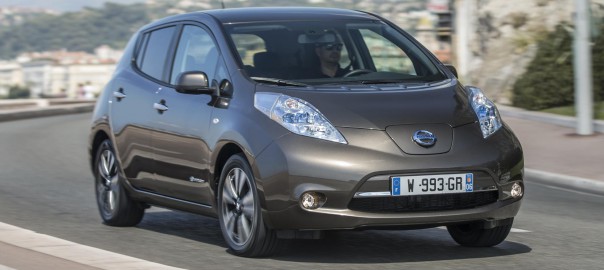What an opportune time for a new electric car…
Indeed. As owners collectively scratch their chins about just how clean their diesel cars really are, Nissan has given its Leaf an extra 26 per cent of range – hiking it to 155 miles – as well as a bit of a spruce-up.

It’s fortuitous timing rather than a clever plan, but you could say the stars have aligned, the most convincing Leaf yet arriving just as internet searches for electric cars exponentially increase.
It looks no different. Why should I care?
It’s unlikely to grab headlines quite like the more obviously revolutionary Toyota Mirai, true. But the Leaf is the world’s best selling electric car, ever. Over 200,000 have been shifted, 11,500 of them in the UK. It currently accounts for more than half of all EVs sold here, and a fifth of plug-in vehicles if you include plug-in hybrids like the Prius and, erm, Porsche 918.
Owners love them, too; the Leaf has the highest satisfaction rate of any car Nissan sells. So you can understand why little has changed: the styling is identical, remaining divisive, and its 109bhp electric motor is untouched, with the only mechanical tweaks occurring to the batteries that lie in the floor.
What’s new?
Their size and packaging are actually identical, but the cathodes are upgraded, helping energy output climb from 24 to 30kWh. In simple terms, this means a claimed 155 miles from a full change, as opposed to 124 miles. Fast chargers will top most of the power back up in 30 minutes for longer journeys via appropriately equipped motorway services.
The 30kWh battery is an option – a £1,600 option, no less – with sales of the 24kWh Leaf continuing. But 80 per cent of buyers are expected to go for the more accommodating setup.
A Tesla Model S will go quite a bit further.
Yeah, but it will also cost quite a bit more than the 30kWh Leaf’s £24,490. And the numbers are spot-on for what people actually use cars in the Golf and Focus class for, according to Nissan. It reckons so-called C-segment buyers travel an average of 30 miles a day, with 98 per cent of them covering fewer than 100 miles daily.
If you’re thinking “the old one could do that,” you’re right. But it’s all about perception: an extension of the range makes people more secure, makes them worry less about driving their EV in a mollycoddling way. Likewise an eight-year warranty on battery degradation is probably overkill in an age of short-term lease deals, but it’s all added peace of mind.
Read more: Top Gear
